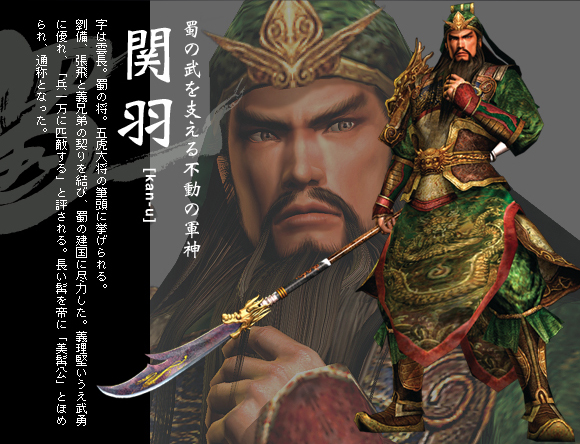

Liu Bei told him about their plan and the three men went to Zhang Fei's home to discuss. While drinking at a restaurant, they met Guan Yu, who was on his way to join the army. Liu Bei then shared his aspirations of saving the country and the people, and Zhang Fei suggested they should together recruit a voluntary militia to combat the Yellow Turbans. He was scolded by Zhang Fei, who worked as a butcher, for not serving the country. Seeing the notice, Liu Bei, a 28-year-old distant descendant of the empire's ruling house, let out a long sigh. When the Yellow Turban rebels were advancing on You Province, the governor posted a conscription notice in Zhuo County. It is also often alluded to as a symbol of fraternal loyalty.Ĭhapter 1 of Romance of the Three Kingdoms sets out the story of the Ten Attendants' usurpation of power and the Yellow Turban Rebellion, which destabilised the Han Empire. The oath bound the three men, who would later play important roles in the establishment of the state of Shu Han during the Three Kingdoms period. Their goal in taking the oath was to protect the Han Empire from the Yellow Turban rebels. Liu Bei, Guan Yu and Zhang Fei took an oath of fraternity in a ceremony in the Peach Garden (believed to be in present-day Zhuozhou, Hebei), and became sworn brothers from then on.

This event is set at the end of the Eastern Han dynasty around the time of the Yellow Turban Rebellion in the 180s A.D. The Oath of the Peach Garden is a fictional event in the 14th century Chinese historical novel Romance of the Three Kingdoms by Luo Guanzhong. Chant – A – mantra (3b): Daily Mantras to Chant – The 4 Main Bodhisattvas of Chinese Buddhism!įor questions, comments, and suggestions please email gmail.Statues of (from left) Zhang Fei, Liu Bei and Guan Yu at Haw Par Villa, Singapore.Chant – A – Mantra (3a): Daily Mantras to Chant!.Chant – A – Mantra (2): When You Need Compassion, Wisdom, and Power!.Chant – A – Mantra: A Reintroduction to the Wonderful Benefits of Chanting A Mantra.You can also read other posts in the Chant – A – Mantra series: The mantra of Vajrapani Bodhisattva is OM VAJRAPANI HUM. The mantra of Bodhisattva Sangharama is NAMO QIE LAN SHENG CHONG PU SA.
#GUAN GONG YU FULL#
This blog is actually full of stories of people who got a lot of blessing from Bodhisattva Vajrapani, thru the Vajrapani Ruel. Other Bodhisattvas Mahasattvas are Bodhisattva Avalokitesvara (Kuan Yin), Bodhisattva Ksitigarbha, Bodhisattva Samantabhadra, and Bodhisattva Manjushri among others.Ĭhanting the mantras of Bodhisattva Sangharama (also known as Qie Lan Pu Sa, Kuan Kong, Guan Gong, Kuan Yu, Guan Yu) and Bodhisattva Vajrapani will provide protection, but more than that it will also shower us with blessing of wealth and good business or good career. Now I would like to make it clear that this difference in ranking is very little, and the Buddhas and Bodhisattvas, I believe don’t look at it that way. Vajrapani Bodhisattva is a Bodhisattva Mahasattva. Bodhisattva Mahasattva is considered higher in rank as oppose to an ordinary Bodhisattva. Why do I say this?Īlthough what we normally hear is simply the word Bodhisattva, strictly speaking there are two types of Bodhisattva, and they are Bodhisattva and Bodhisattva Mahasattva. Bodhisattva Sangharama or Kuan Kong is a very powerful Bodhisattva, although strictly speaking, and I’m uncomfortable writing about this, technically speaking Bodhisattva Sangharama is “lower in rank” compared to Bodhisattva Vajrapani. But when I mentioned them to my friends and other readers whom I have met in person, the most question they ask is whether they are one and the same. Both Bodhisattvas are highly revered, one in Chinese Buddhism and the other one in Tibetan Buddhism.
#GUAN GONG YU SERIES#
On this third part of the Daily Mantras to Chant of the Chant – A – Mantra series I would like to talk about the two other mantras that I chant daily specifically for protection, for business or career and wealth. The first seven Buddhas and Bodhisattvas whose mantra I wrote about are what you call universal mantras, although I did still wrote about what they are really good for. In the preceding posts of the Chant – A – Mantra series where I talked about the Daily Mantras to Chant, which is basically the everyday mantras that I chant, I talked about the 3 Main Buddhas of Chinese Buddhism and the 4 Main Bodhisattvas of Chinese Buddhism.


 0 kommentar(er)
0 kommentar(er)
